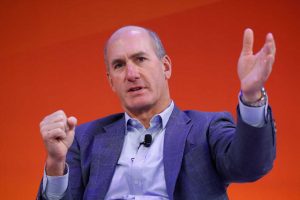AT&T CEO says dividend cut not needed to fund growth, touts HBO Max's upcoming ad-supported option

- AT&T can keep its dividend while investing in growth around digital streaming and other endeavors, CEO John Stankey told CNBC Friday.
- "I feel very comfortable … that we can sustain that right now and not have to walk away from the opportunity to keep this a strong and sustainable business," he said.
- Stankey also touted new developments around HBO Max, including launching in new international markets and its ad-support option.
AT&T CEO John Stankey told CNBC on Friday the company can maintain its dividend payment while still investing in growth businesses like direct-to-consumer streaming service HBO Max.
Stankey made in the comments on "Squawk on the Street" in response to a question from CNBC's David Faber, who asked the CEO if money AT&T used to pay the dividend would be better spent accelerating its digital transformation.
That's a binary choice AT&T does not have to make right now, Stankey responded.
"I feel very comfortable when we're down at 50, low 50s, mid 50 payout ratios on the dividend, that we can sustain that right now and not have to walk away from the opportunity to keep this a strong and sustainable business," said Stankey, appearing on CNBC asAT&T's host its Analyst and Investor Day.
"The moment that I cross a path where I don't think that can happen, or that we're not getting recognized for that capital return, of course I've got to ask that question," Stankey added. "But we're not in that position."
AT&T paid out $15 billion in dividends in 2020 while generating $27.5 billion in free cash flow, putting the company's total dividend payout ratio at 55%, according to its Jan. 27 earnings release. For the upcoming year, the company projects free cash flow to be in the $26 billion range and its dividend payout ratio to be in the "high 50's% range."
AT&T had a dividend yield of around 6.8% on Friday as its shares traded at more than $30 each.
Stankey said he's confident AT&T will be able to grow its revenues going forward. Revenue came in at $171.8 billion in 2020, a year upended by the coronavirus pandemic, compared with $181.2 billion in 2019.
"Our belief is we've got the portfolio of growth," Stankey said, adding the company was deploying its "time and energy … in a way that we think we can be successful in those markets and return this business to top-line growth."
HBO Max, which is part of AT&T's WarnerMedia division, is a key focus for the company.
Stankey said he sees reasons to be optimistic and believes new subscribers will continue to flock to the streaming service.
AT&T on Friday increased its subscriber forecast for HBO Max and HBO, projecting global subscribers of between 120 million and 150 million for HBO Max and HBO by the end of 2025. At the end of fiscal year 2020, global subscribers reached nearly 61 million for HBO Max and HBO and U.S. subscribers 41 million, aided by the Christmas Day release of "Wonder Woman 1984."
"We grew more in the last seven months of last year than we did in the previous decade," Stankey said.
The company is planning to launch HBO Max in Latin America and later Europe, he said. "Add to that the exciting development of bringing in an ad-supported option for customers [in June], which broadens the opportunity domestically in the United States to start attacking price points that we've been locked out of," he said. "The team feels really good about their momentum. We haven't seen our best days."
AT&T's new forecast comes as Netflix recently surpassed 200 million subscribers during the fourth quarter of 2020, and and Disney's streaming service Disney+ surpassed 100 million subscribers just 16 months after its launch.
Stankey also said he's pleased with the recent performance of WarnerMedia's Turner division, which includes the likes of TNT and CNN. The latter is coming of a "record year, record ratings, record revenue," he said.
"We have very capable people who have done a nice job positioning those assets to even be relevant in what I would call that shrinking dynamic of the cable bundle — not only shrinking from a subscriber base but shrinking in terms of the number of channels that are relevant for a customer to carry forward," he said.
— CNBC's Sarah Whitten contributed to this report.
Source: Read Full Article
